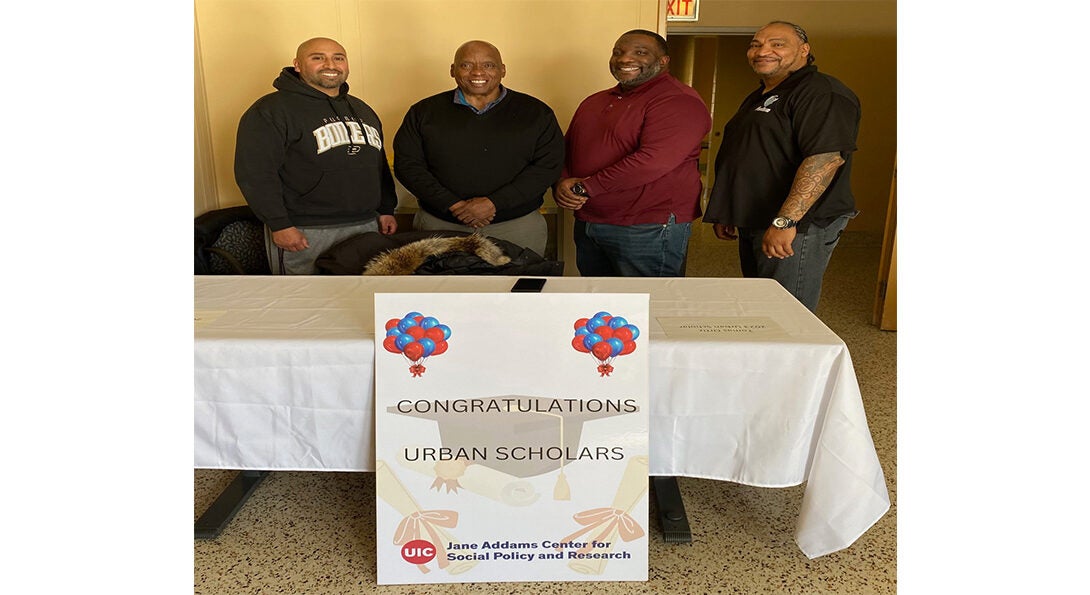New JACSW Urban Scholars Find Education Key to Unlocking Future

Twenty years behind bars gave Augustin “Augie” Torres a lot of time to think. His days and nights were filled with thoughts about what his life would be like once he was released from prison. Unsure of what the future held, he was certain he was not going to return to the life he led that put him there. The one thing he needed to succeed in transforming his life, he felt, was to further his education.
Torres is one of four men selected as the 2023 cohort of the Urban Scholars Program, initiated by the Jane Addams College of Social Work’s Center for Social Policy and Research (Policy Center) to address the injustice of mass incarceration and its disproportionate impact in communities of color by supporting individuals with justice system involvement to earn a college degree.
Led by Joseph Strickland, PhD, senior researcher at the Policy Center, the Urban Scholars Program focuses on providing former prisoners who are interested in advancing their education or working in academia an opportunity to receive mentoring, support (through identifying and applying to schools) and work on an actual research project. The scholars enter the program as graduate students and receive a $600 stipend. They are not limited to attending UIC; awardees have also been enrolled at Northeastern Illinois University, Governors State University, and the University of Chicago.
Lack of education, Strickland said, is a contributing factor why many individuals become incarcerated. They may have attended schools with poor educational methods, or their relationships with their teachers were lacking and they dropped out, or their performance was so poor that they felt academic success was unachievable.
“The Urban Scholars Program was started to help people in those situations – people who are returning to their community and need a network to support them in attaining a college degree,” Strickland said.
The Urban Scholars Program (started in 2021 with an initial class of nine) is part of the Policy Center’s Free to Excel Program, which focuses on the same population but the recipients can be at any point in their college career. Under the direction of Terrell Campbell, MA, Free to Excel has a network of community-based services and partnerships to assist returning citizens in bridging the gap between incarceration and higher education. Securing employment and achieving financial independence, however, may be more of an immediate priority than higher education. For those individuals Free to Excel is helping them complete their GED or access vocational training.
Working with community partners, Free 2 Excel is also helping people through workforce development services, job and career readiness services and assisting with resume and interviewing skills, Strickland said. Some JACSW faculty are also part of the program, leading educational workshops. Assistant Professor Charles Hounmenou, PhD, facilitated a discussion on the topic, “Navigating the Hurdles to Getting your PhD Degree: Knowledge, Experience & Perspectives,” while Associate Professor Brandon McLeod, PhD, presented “Parenting and Partnering while PhDing.”
Along with Torres, Tomas Ortiz, David Rivers and Demeatreas Whatley were selected as Scholars. This is the second consecutive year Ortiz has been chosen. He is currently pursuing a master’s degree in social work at the JACSW, while Rivers is nearing completion of a doctorate degree at Governors State University. Torres is currently enrolled in the master’s program at the University of Chicago, where Whatley also earned his master’s degree in social work while being named an Obama Scholar. All scholars are employed while attending classes.
During Torres’ final four years of incarceration, he taught English as a Second Language (ESL) courses to his fellow inmates at Danville Correctional Center through the Education Justice Project, a comprehensive college-in-prison program based at the University of Illinois Urbana-Champaign and conducted at the medium-security men’s prison 45 minutes from the UIUC campus. The work gave Torres purpose, and the more he led the classes, the more excited he was about his future. But he knew his release was not going to be without its challenges.
“While I was in prison (from the ages of 16 to 36) I found there to be a lot of barriers and inequities,” said Torres, who was recently named executive director of the nonprofit organization, Reading Between the Lines, which engages justice-involved adults in active discussions of literature to develop the critical thinking skills needed to successfully re-enter into society. “I want to help eliminate those barriers for others. I want to create the change I would like to see.”